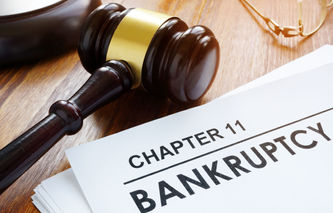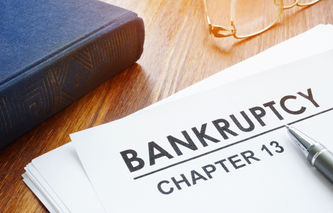Businesses that are no longer interested in continuing to operate, or individuals that do not have enough income to repay their debt, can seek protection from creditors by filing a Chapter 7 petition in bankruptcy court. But filing for Chapter 7 comes at a great cost. It requires the debtor to selloff their assets and can damage credit ratings.
In this article, we're going to cover the basics of Chapter 7 bankruptcy, also known as liquidation. As part of that explanation, we're going to review the rules of the Chapter 7 process. We're also going to explain some of the eligibility requirements, as well as the advantages and disadvantages of filing for Chapter 7. Finally, we'll talk about the role of the trustee, and the discharge of debt.
Chapter 7 Bankruptcy Process
Unlike the Chapter 13 bankruptcy process for individuals, or the Chapter 11 process for businesses, Chapter 7 does not involve the reorganization of debt, but the liquidation of the debtor's assets. There is no filing of a repayment plan; the process involves the assembling of assets and their subsequent sale. The money from the sale of these assets is then distributed to creditors.
Interestingly, Chapter 7 is also the most popular choice of filers, with around 60% of all cases falling into this category. The table below shows the number of Chapter 7 filings from 2007 through 2019:
Year | Chapter 7 Filings |
2007 | 519,364 |
2008 | 744,424 |
2009 | 1,050,832 |
2010 | 1,139,601 |
2011 | 992,332 |
2012 | 843,545 |
2013 | 728,833 |
2014 | 619,069 |
2015 | 535,047 |
2016 | 490,365 |
2017 | 486,374 |
2018 | 475,575 |
2019 | 469,556 |
Source: U.S. Bankruptcy Courts
Eligibility Rules
The eligibility rules for Chapter 7 are straightforward:
The debtor can be an individual, partnership, corporation, or any other business entity.
If the debtor's monthly income exceeds the state median, then a "means" test must be conducted to overcome a "presumption of abuse." For example, if the debtor's total income over five years (less certain standardized living expense allowances) is over $10,950, the applicant must file for Chapter 13 or prove special circumstances exist.
If the debtor failed to appear in court, comply with court orders, or had a prior filing dismissed during the preceding 180 days, the debtor cannot file for bankruptcy.
Finally, any individual attempting to file under Chapter 7 protection must have received credit counseling from an approved agency during the preceding 180 days.
Filing Requirements
Individuals file their bankruptcy petition in a court that is designated as servicing their residence. Debtors will be asked to provide schedules of their assets, liabilities, income, as well as a detailed outline of all expenses. Businesses will also be asked to provide a statement of financial affairs, as well as obligations under contracts and leases.
Individuals must also file a certificate of credit counseling, as well as any debt repayment plan developed with the counselor. Anticipated increases in monthly net income that may occur after the filing must be disclosed. Debtors will need to provide a list of all known creditors, and the amounts owed each lender.
The filer must also provide the trustee with income tax returns for the most recent year, as well as any tax return that is filed before the case is settled.
Chapter 7 Trustees
The filing process requires the appointment of a trustee to oversee the case. The trustee will also organize all the documentation collected from the debtor, as well as assume the responsibility of distributing the money collected from the sale of assets back to all known creditors.
If there are valid liens or claims on all the debtor's assets (secured debt), or the assets are considered exempt, then the trustee will file a "no asset" report. If the case turns out to be an asset case, the trustee's primary responsibility will be to maximize the return of funds to creditors associated with unsecured debt.
Liquidation of Assets
If the filing is found to be an asset case, then an "estate" is created. This estate then becomes the legal owner of the debtor's non-exempt assets. Trustees will oversee the sale of all assets, and begin the process of distributing proceeds to creditors.
There are six classes of claims, and each must be paid in full before the next class is paid. Those classes include:
Priority Claims: includes items such as administrative fees, fees charged against the estate, wages and commissions of the debtor's employees (90 days before filing), child support, and taxes.
Unsecured "Allowed" Claims: includes all creditors that have provided a proof of claim.
Tardy (Late) Unsecured "Allowed" Claims: includes all creditors that have provided a proof of claim, but filed their proof of claim after prescribed deadlines.
Fines and Penalties: includes punitive damages, fines, penalties, and forfeiture claims that occurred before the date of the filing.
Interest Charges: includes interest charges at a legal rate from the date of the bankruptcy filing on any claims paid.
Debtor: following the sale of all assets, and once all of the above five classes have been paid in full, any remaining money is distributed to the debtor.
Pros and Cons
One of the disadvantages of filing for bankruptcy is that a record of the filing stays on an individual's credit report for up to 10 years. In Chapter 7 bankruptcy cases, the debtor will lose possession of all non-exempt assets. Filers are also prohibited from seeking bankruptcy protection for six years. Finally, the courts could convert the Chapter 7 filing to a Chapter 13 case if sufficient income exists. This means the debtor may be obligated to repay debts for as many as five years.
The advantage of filing for Chapter 7 is that it allows the debtor to start rebuilding their lives as well as their credit. The entire process is relatively fast, taking only three to six months to complete. Declaring bankruptcy will also stop all aggressive collection agency activities.
Discharge of Debt
A discharge releases the debtor from all future obligations to repay any remaining debt to creditors. This means creditors can no longer seek repayment of any discharged debt. Unfortunately, Chapter 7 allows for many exceptions; therefore, debtors should always seek legal counsel before filing a case.
In addition, the court has the ability to deny a discharge if it believes the debtor:
Failed to explain adequately how an asset was lost
Committed perjury
Transferred, destroyed, or concealed property
Debtors are allowed to retain secured property if they commit to a reaffirmation agreement. For example, the debtor may wish to reaffirm an automobile loan if the vehicle is used for travel to work. This agreement is between the debtor and creditor, and it allows the debtor to keep the property as long as timely payments are made to the creditor. If the debtor wishes to reaffirm a debt, the agreement must be in-place before discharge occurs.
Discharged debt excludes payments arising from legal proceedings such as the cost of child support, alimony, personal injury awards, and crimes. Finally, debts owed to government agencies such as income taxes, and student loans are not discharged under Chapter 7.



